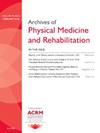Multisite Musculoskeletal Pain Are Associated with Long-term Declined Physical Quality of Life and Knee-related Quality of Life in Older Adults Knee OA 8266
IF 3.6
2区 医学
Q1 REHABILITATION
Archives of physical medicine and rehabilitation
Pub Date : 2025-04-01
DOI:10.1016/j.apmr.2025.01.059
引用次数: 0
Abstract
Objectives
To examine the longitudinal impact of multisite musculoskeletal pain (MMP) on the physical and mental health-related quality of life (HRQOL) in individuals with or at risk of experiencing knee osteoarthritis (OA).
Design
Longitudinal study.
Setting
Multiple sites.
Participants
This study employed a prospective longitudinal design with over 8 years of follow-up. Data from 4796 participants aged 45-79 years were obtained from the OA initiative.
Interventions
Not applicable.
Main Outcome Measures
This research mainly focused on assessing the HRQOL, which was measured using the Medical Outcomes Study Short-Form 12 (SF-12) at various times over 7 visits across a period of up to 96 months. We employed the knee injury and osteoarthritis outcome score (KOOS) for knee-related QOL. The KOOS, a self-reported measure of knee outcomes, included 42 items. The KOOS covers 5 subscales: pain, symptoms, activities of daily living function, sport and recreation function, and knee-related QOL. This study employed the KOOS for knee-related QOL subscale. It consisted of 4 items. This subscale was normalized into a 0-100 score, with a higher score indicating better health status. Multisite pain was examined using a self-report questionnaire at 20 sites.
Results
The results showed that participants with one painful site (Beta [B]=−0.92, P=.01), 2 painful sites (B=−1.94, P<.001), and multiple painful sites (≥3) (B=−4.68, P<.001) were significantly associated with decreased composite score for the physical HRQOL over time compared with those with no painful site at baseline after adjusting for covariates. However, there was no significant association with the decline in mental HRQOL over time. All multisite pain categories were associated with worse overtime symptoms in knee-related QOL using KOOS including one painful site (B=−6.97, P<.001), 2 painful sites (B=−9.96, P<.001), and multiple painful sites (≥3) (B=−17.56, P<.001) after controlling for covariates.
Conclusions
This study revealed that baseline MMP was linked to declining physical QOL and knee-related QOL among individuals with or at risk of experiencing knee OA. Moreover, baseline multisite pain and 2 painful sites were associated with a decline in physical QOL and KOOS of QOL, whereas mental HRQOL was not significantly associated with multisite pain. Therefore, it is imperative for primary health care settings to prioritize the assessment of MMP and develop interventions aimed at preserving and enhancing physical HRQOL in people with or at risk of experiencing OA.
Disclosures
none.
多部位肌肉骨骼疼痛与老年人身体生活质量和膝关节相关生活质量的长期下降有关
目的探讨多位点肌肉骨骼疼痛(MMP)对患有或有患膝骨关节炎(OA)风险的个体身心健康相关生活质量(HRQOL)的纵向影响。DesignLongitudinal研究。SettingMultiple网站。本研究采用前瞻性纵向设计,随访时间超过8年。来自4796名年龄在45-79岁的参与者的数据来自OA计划。InterventionsNot适用。主要结果测量本研究主要侧重于评估HRQOL,使用医疗结果研究短表12 (SF-12)在长达96个月的7次访问的不同时间进行测量。我们采用膝关节损伤和骨关节炎结局评分(kos)来衡量膝关节相关的生活质量。oos是一种自我报告的膝关节预后测量方法,包括42个项目。KOOS包括疼痛、症状、日常生活活动功能、运动娱乐功能和膝关节相关生活质量5个量表。本研究采用kos作为膝关节相关生活质量量表。它包括4个项目。该分量表被归一化为0-100分,分数越高表明健康状况越好。在20个部位使用自我报告问卷检查多部位疼痛。结果结果显示,与基线时无疼痛部位的受试者相比,有一个疼痛部位(β [B]= - 0.92, P= 0.01)、两个疼痛部位(B= - 1.94, P= 0.01)和多个疼痛部位(≥3)(B= - 4.68, P= 0.01)的受试者的HRQOL综合评分随时间推移显著降低。然而,随着时间的推移,与精神HRQOL的下降没有显著的联系。所有多部位疼痛类别均与膝关节相关生活质量的加重症状相关,包括一个疼痛部位(B= - 6.97, P<.001)、两个疼痛部位(B= - 9.96, P<.001)和多个疼痛部位(≥3)(B= - 17.56, P<.001)。结论:本研究表明,基线MMP与患有或有患膝关节OA风险的个体的身体生活质量和膝关节相关生活质量下降有关。此外,基线多点疼痛和2点疼痛与身体生活质量和生活质量的kos下降有关,而精神HRQOL与多点疼痛无显著相关性。因此,初级卫生保健机构必须优先评估MMP,并制定干预措施,以保持和提高患有或有可能经历oa的人的身体HRQOL。
本文章由计算机程序翻译,如有差异,请以英文原文为准。
求助全文
约1分钟内获得全文
求助全文
来源期刊
CiteScore
6.20
自引率
4.70%
发文量
495
审稿时长
38 days
期刊介绍:
The Archives of Physical Medicine and Rehabilitation publishes original, peer-reviewed research and clinical reports on important trends and developments in physical medicine and rehabilitation and related fields. This international journal brings researchers and clinicians authoritative information on the therapeutic utilization of physical, behavioral and pharmaceutical agents in providing comprehensive care for individuals with chronic illness and disabilities.
Archives began publication in 1920, publishes monthly, and is the official journal of the American Congress of Rehabilitation Medicine. Its papers are cited more often than any other rehabilitation journal.

 求助内容:
求助内容: 应助结果提醒方式:
应助结果提醒方式:


